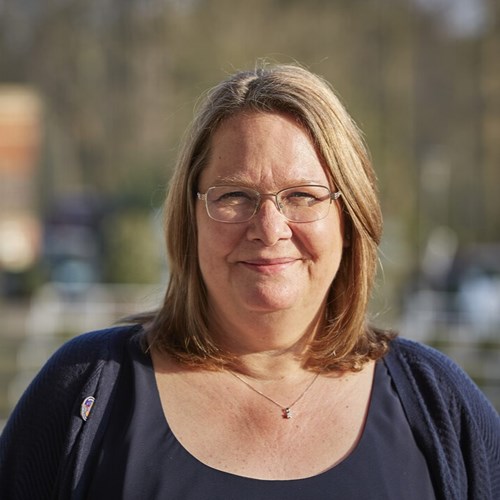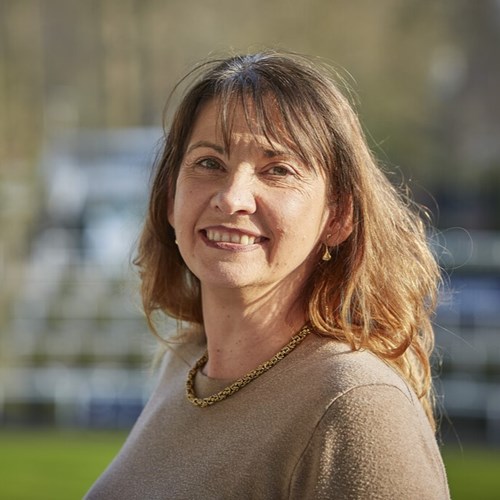Our taskforce
Our taskforce
Our anti-racism taskforce is a dedicate team responsible for driving positive change and fostering an inclusive, equitable and antiracist organisational culture.
Our aims
- Develop an anti-racism strategy
- Establish a system for tracking and reporting on progress on anti-racism initiatives
- Advocate for resources and support needed to execute the anti-racism strategy effectively
- Assess policies and procedures to identify potential biases and discriminatory practices
- Raise awareness about racism, privilege and unconscious bias
- Create mechanisms for colleagues to express concerns, share experiences and provide feedback
Meet our team

Mike Craissati
Freedom to Speak Up GuardianHis role is to support staff to speak out when they witness poor practice. This includes speaking out about negative experiences or behaviours around people’s protected characteristics. Mike believes Berkshire Healthcare is making good progress in developing an anti-racist culture, although there is still a long way to go. He says, “The action the organisation is taking is necessary and correct. It now needs to act on pledges made, listen to its employees and local community, and ensure they are engaged in the process as well as consulted upon.” Mike says that the journey to becoming an anti-racist ally is one of self-discovery. “Don’t be afraid to make mistakes or ask questions. Being anti-racist is a challenge that we shouldn’t shy away from; it’s something we should all aspire to.”

Ash Ellis
Deputy Director for Leadership, Inclusion, and Organisational ExperienceAsh Ellis is Berkshire Healthcare’s Deputy Director for Leadership, Inclusion, and Organisational Experience. Ash is passionately committed to anti-racism and believes being anti-racist is everyone’s responsibility. Ash says, ‘As a white male, I know my privilege, and therefore it is my responsibility to learn, grow and understand ways I can respond and interrupt to help dismantle racism.” Ash believes that it’s not enough to ‘not be racist’ as racism is all around us. He says, “If we’re going to dismantle racism, we all need to take action and be ‘anti-racist’. It will take courage, thinking, feeling uncomfortable, and educating yourself to understand better. Firstly, you need to accept that there is systemic and society-wide racism. In the workplace, Ash aims to use his privilege to be an ally and help unblock or remove any barriers by listening, understanding, and reviewing policies and protocol through an anti-racism lens to unlock doors and opportunities that may have otherwise been closed.

Julian Emms
Chief Executive
When asked what the difference is between not being racist and being anti-racist, he said, “At its simplest, anti-racism is a process of actively identifying and opposing racism. The goal of anti-racism is to challenge racism and actively change the policies, behaviours, and beliefs that perpetuate racist ideas and actions.” “The thing that stands out most for me is that anti-racism is rooted in action. It’s about all of us at Berkshire Healthcare taking steps to eliminate racism at every level.
One of my personal objectives is to ensure that by March 2025 the composition of the senior leadership team (the people who report to the executive directors) is reflective of the ethnic diversity of the organisation as a whole.”

Debbie Fulton
Director of Nursing and TherapiesDebbie Fulton is our Director of Nursing and Therapies. Debbie says, “My values of compassion, integrity and fairness drive everything I do, and it is these values that inspire me to be involved in achieving equity for those whose experiences are not what we would want for our loved ones, friends, colleagues or patients; to be truly inclusive we need to proactively take action together to tackle racism.” Anti-racism in the workplace means speaking up when you witness racism, but Debbie says that it’s also about looking at policies and procedures from a different perspective and being guided by those who have lived experience. Debbie says, “Those who experience racism cannot solve the issue by themselves, nor should they be expected to. We all need to step up and work together. At Berkshire Healthcare, I believe that we have the commitment and building blocks in place to make a real difference.”

Alex Gild
Deputy Chief ExecutiveAs Deputy Chief Executive, Alex recognises that he can use his influence to ensure Berkshire Healthcare takes meaningful, explicit action against racism. Alex says, “If we are to be a truly inclusive organisation and achieve equity for our communities and staff we must tackle discrimination in all forms, together.” Alex believes that meaningful anti-racist action, and ensuring people experiencing discrimination are seen, included, and supported, will lead to better quality healthcare and improved outcomes, access and experience for patients.
He acknowledges there is a lot of work to do but is confident that once we start to act, we’ll make a positive impact. Alex says, “We have our anti-racism statement, the challenge now is to convert our commitment into effective action with our services and communities, to achieve equity and inclusion.”

Rose Hombo
Inpatients Service Director
I am the Director for the Mental Health Inpatient Services at NHS Berkshire Healthcare Foundation Trust. I am a Mental Health Nurse by profession and have been for 28 years and with the Trust since September 2024. Racism is real and it exists everywhere. It is a very uncomfortable topic for most organisations and can be quite complex on multiple levels. I am very passionate about equality and championing inclusivity at all levels. Our goal is to dismantle racism here at Berkshire Healthcare and create a culture where everyone matters and feels comfortable at work. To achieve this, we need to make some bold, yet positive steps – and although we have started the journey with good initiatives, we still have more to do. The challenge for us as a Trust is that we operate within a system where racism is deeply ingrained, and the existing structures do not naturally align with some of our initiatives, values, or what can be described as anti-racist work. However, we can rise to this challenge and lead the way in tackling racism and all forms of discrimination and inequality.

Karla Innis
Head of Inclusion, OD, and Organisational ExperienceShe has unique lived experience of Black Caribbean and white British heritage, socio-economic disadvantage, a disability, is a mother of two young children, and a resident of Berkshire. She believes that if we are to fulfil our commitment to becoming an anti-racist organisation, we need to improve our understanding of what anti-racism means, be honest about what we’re prioritising and the progress we’re making and demonstrate that we have closed unacceptable gaps for our ethnically diverse community across access, experience, and outcomes. Karla says, “Racism is complicated and there are lots of ways we can measure improvement, for example in outcomes, but I also feel it is important to think about how people feel about our progress too. Involving colleagues and our community will help us to check that what we do and how we do it, are the right things that are important to us all.”

Jai Jayaraman
Regional Equality, Diversity, and Inclusion Lead, East Berkshire
When asked what the difference is between not being racist and being anti-racist, Jai said, “I imagine that most people who work at Berkshire healthcare would consider themselves not racist. However, this is a neutral stance; an inclusive and non-racist workplace doesn’t just mean there is an absence of overt racism. Being anti-racist means working together to actively challenge racism at individual, structural and institutional levels. Our focus now needs to be on addressing the policies and systems that allow racism to become institutionalised in the workplace. “I feel sad that many people have colour feel discriminated against and have been badly treated, however I’m pleased that Berkshire Healthcare have made a commitment to address this. I feel hopeful about the future and confident that we have the commitment and the right leadership to achieve meaningful change.”

Amy Jones
Project Manager, Trust PMOAmy Jones is a Project Manager, working within the Programme Management Office. She says, “We’re on a journey to eliminate racism, a journey that is everyone’s responsibility, and requires active steps to listen, hear, understand, and act to support colleagues and communities.”
Amy believes that that Berkshire Healthcare has started to make good progress in encouraging an anti-racist culture. She says, “I’ve worked here for 12 years, and this is the first time we have made a formal commitment to challenge racism and actively make improvements that support our staff, and our communities”.

Jane Nicholson
Director of People
She says, “Although as a white woman I’ve not personally experienced racism, I was deeply impacted by the stories my Irish father shared about the racism he experienced when he moved to England in 1937. His experiences motivate and drive me to enhance my understanding and contribute positively to creating an environment that’s inclusive for everyone.” Jane’s aim is to develop a culture where everyone can thrive and feel values and supported to be themselves. She feels that there is a real sense of commitment in the trust to drive forward positive change and shape an anti-racist organisation where staff and patients feel safe. She says, “We know that building a truly anti-racist culture will take time. However, we have made a clear commitment to be an anti-racist organisation, which is the first step of the journey. The next step is to ensure that our actions and initiatives are clear and we consistently following through on them.”

Tolu Olusoga
Medical DirectorI recently joined Berkshire Healthcare as the Medical Director in March 2025. One of the key attractions for me, was evidence of a genuine interest to address anti-racism in all its forms at executive level, and to bring about change at all levels across the organisation. It’s not an easy task; it takes a time to work with colleagues at all levels at the Trust. We need to be prepared to challenge racism wherever we find it within Berkshire Healthcare - ensuring that our patients, carers and staff are not subject to discrimination. We are committed to following through with actions to support our staff to ensure they can focus on providing good quality care without fear of racial abuse. I am personally committed to supporting our staff on our journey to create an anti-racist culture at Berkshire Healthcare.

Sarah Walker
Deputy Director of CommunicationsShe says, “Berkshire Healthcare has committed to becoming an anti-racist organisation. I see this as an opportunity to learn, as well as a challenge for me personally to review own approach to life and how I can be actively anti-racist.”
“Communications will play a vital role in explaining, sharing and celebrating the work we are doing in this area. As well as supporting the workstreams, we’ll be looking at the work we do as team – internal communication, media, communications to patients and stakeholders, digital communications – to ensure we’re bringing an ant-racist approach in our language, imagery and content.”